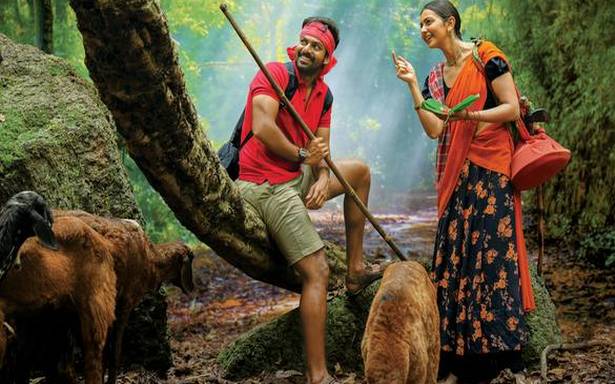Krish Jagarlamudi’s fable-like coming-of-age Telugu film is a rewarding visual and musical experience, but needed more depth
There’s something comforting and reassuring about fables that pack in life lessons through simple stories. It’s like a throwback to a time when life was less complicated. At the heart of director Krish Jagarlamudi’s Konda Polam (forest grazing) is a fable-like story, adapted from the Telugu novel of the same name by Sanupureddy Venkatarami Reddy. In the process of shepherding a huge flock of sheep into the hilly jungles to survive drought in the plains, a young man rediscovers himself and finds his purpose in life.
The story is set in the arid Rayalaseema region, in the vicinity of Nallamala forest, though the film has been mostly filmed in Vikarabad and Ananthagiri hills owing to COVID-19 restrictions. Konda Polam draws our attention to a lesser-known fact — of shepherds in a village where water is a luxury, having to venture into the wilderness to find food and water for their flock of sheep. The seasoned shepherds, weathered by vagaries of life and the terrain, know how to survive in the jungles and stave off predators of all kinds — animals, reptiles and devious men. Konda Polam
- Cast: Vaisshnav Tej, Rakul Preet Singh
- Direction: Krish Jagarlamudi
- Music: M M Keeravani
Krish leads us into this world through Kataru Ravindra Yadav (Vaisshnav Tej), born into a shepherd family but somewhat of an outsider, since he has had the privilege of being educated rather than being pulled into tending sheep. But Ravindra has been following the herd of another sort, becoming an engineer with the hope that he will get a well-paying job, while neither understanding nor having an aptitude for it.
He ventures into the jungle, accompanied by his father (Sai Chand) and fellow villagers that include Obulamma (Rakul Preet Singh), with his eyes reflecting his inexperience and guilt in not being able to earn to ease the burden of his elders.
Once the shrill initial excitement of some of the shepherds wears off and they venture deeper into the woods, there’s an effort to make Konda Polam an endearing regional The Jungle Book, if you will.
There are no major surprises in the story. Since it unfolds as a flashback, we know the new responsibilities Ravindra is likely to take up and that the jungle has been a major influence on him. Threats from reptiles, tigers and smugglers are all part of the game.
The grandeur of the tagline ‘an epic tale of becoming’, emerges mostly from M M Keeravani’s music and V S Gnanashekhar’s cinematography. The aural and visual landscape try to elevate a simple story. The camera lingers lovingly on breathtaking visuals in the deep as well as captures the eeriness of the forest.
Once the lessons from the jungle are discussed, the adventures of the shepherds feel repetitive in the later potions. The duets and an underwhelming climactic portion also rob the film of its gravitas.
The story of Ravindra’s transformation could have been so much more. Though the tale is well-intentioned and often compares the struggle for survival in the jungles to the survival of the fittest in concrete urban jungles, we don’t feel its impact.
Vaisshnav Tej is effective in portraying the naivety required for his character. Surrounded by seasoned performers, he gamely immerses himself into the jungle milieu. In the emotional portions, particularly the scene where Obulamma confesses her love to him, his lack of experience shows. Rakul, sporting a tanned look, strikes a fine balance between being fun-loving and lending credence to who Obulamma is — a girl who had to make peace with the lack of opportunity for education. Her lip sync to the rustic Rayalaseema dialect is never out of place.
Konda Polam has a reliable supporting cast — Sai Chand, Hema, Kota Srinivasa Rao, Mahesh Vitta and Racha Ravi. Ravi Prakash shines in the telephonic monologue with his wife, where he puts forth his limitations and shows that he values her education and the stability she brings to the relationship. There are immersive and engaging segments such as this in the film but despite all that, it ends up feeling underwhelming, as though the fable has been stretched more than necessary.
Source: Read Full Article

